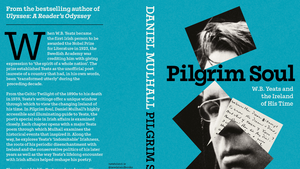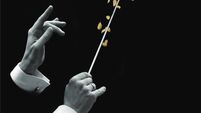View from the Green Room: A pilgrim’s progress

There’s a holy trinity of players at work in Dan Mulhall’s new book on WB Yeats. There’s the poet himself, the Irish political state and the writer. Given Mulhall’s vast knowledge of the poet, his position as President of the Yeats Society and a life spent in thrall to the magic of Yeats’ verse, don’t expect a detached viewpoint.
It’s an unusual stance. Most biographers stand at a distance, unroll the facts and issues and let the reader decide. Dan Mulhall’s position differs radically from this and it’s this committed viewpoint that makes “Pilgrim Soul” such a compelling read.
Another biography of Yeats, I wondered? Do we really need another one? But Mulhall’s thesis is the manner in which radically changing Irish politics shaped Yeats as a poet, as a man and, crucially, as a citizen of a vastly changing Ireland.
The book frames interesting questions. Would his poetry have been as significant if it had not been part of the whirlpool of Irish nationalism that encompassed the Rebellion, the War of Independence, the Civil War, the conversion of Fianna Fáil to constitutional politics and the establishment of a cultural literature that would wrap its arms around Gaelic Ireland and the new Free State?
The beauty of Dan Mulhall’s book is that, not only does it weave its way through all of these questions in an easily understandable sequence, but that it also affords a compelling insight into Yeats’ poems. Equally compelling is Yeats’ own personal journey and the exploration of the complexity of Yeats’ changing opinions. Nor does the author shy away from dealing with Yeats’ vaulted – if, somewhat preposterous, opinion of the Anglo Irish or, indeed, of his own influence on Irish political affairs. Mulhall also throws the issues of the poet’s condescension into the mix – at one point, Yeats struggled to see the value of reading and writing for the working classes –or, indeed, Yeats’ snobbery. It could be argued that Yeats was the man who put the nob in snob!
As a former teacher of English, I can confirm that Yeats never wrote anything simple. His work was rarely about what it was about. Just think it out. Would “nine bean rows and a single hive” really sustain anyone on an uninhabited rock called Inishfree in Lough Gill? Just how old and how long were these “nine and twenty swans” hanging around Lady Gregory’s patch at Coole? This writer does much to answer these questions. And does it in a disarmingly easy-to-follow way. Dan’s analysis and political contextualizing of Yeats’ poems is a down-to-earth joy and certainly worth the ticket.
“Pilgrim Soul” steps us through the public poems in tandem with the great events of the foundation of the state. “No Second Troy”… September 1913… Easter 1916… are all contextualised with the events of their times.
My own Yeats favourites are the later works when Yeats began to take stock of his advancing years and Mulhall’s analysis of them is fascinating. His search for intellectual immortality in “Sailing to Byzantium” and his realistic appraisal of years spent in pursuit of a theatrical dream in “The Circus Animals Desertion” when he came to realise that “when all is said, It was the dream itself enchanted me” find a place here.
So does the great warhorse of “Among School Children” where Yeats sails a course through ancient philosophers – Plato, Aristotle and Pythagoras – in search of the meaning of life and our own bit-part within it.
Dan moves quickly through the poet’s later years as he covers the poet’s role as a Senator, a smiling old man, a lover – Yeats would have won the Seniors event in the Olympics if there had been a competition in sexual gymnastics – and finally his death in the South of France in 1929.
If you want to know about Yeats, Dan Mulhall’s “Pilgrim Soul” is the book for you.






